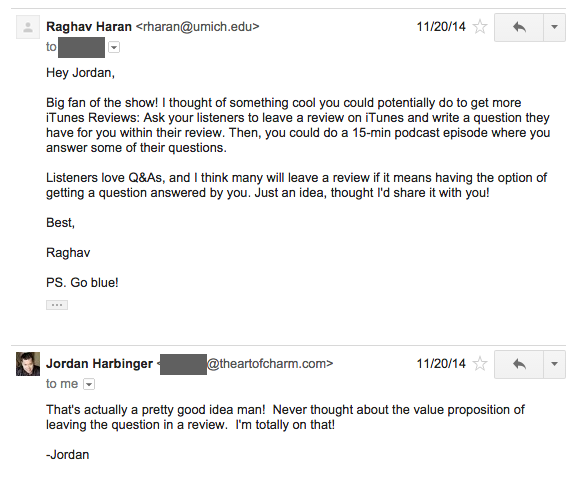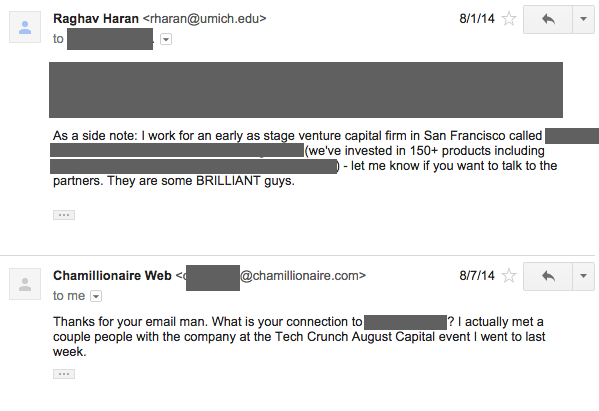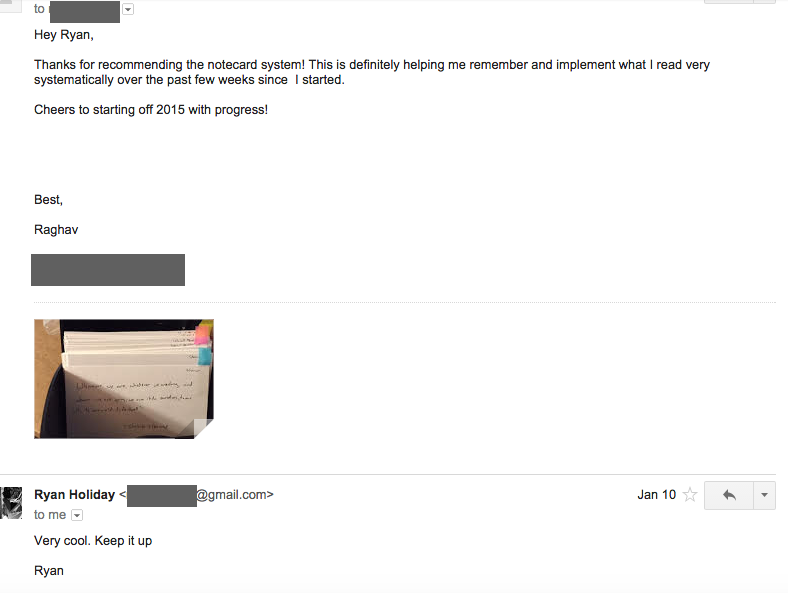When we get out of college, we usually take any job we can get.
After all, it’s not what we’re going to be doing for the rest of our lives, right?
But after several years, something begins to shift. Some people’s careers skyrocket out of the blue.
They suddenly get a huge promotion. Or get featured in the press. Or work with celebrities.
They start to get tons of opportunities thrown at them, while everyone else complains that there are “no jobs left” in this economy.
They land jobs they love so much they can’t stop talking about them, while so many others drag themselves out of bed everyday to go “back to the grind.”
What are they doing differently?
I can tell you this: It’s not because they tried harder, lived in the right place, went to the right school, or got some magical credential.
Here’s one huge thing they all did behind the scenes: They built an authentic relationship with one powerful person, then got into their inner circle. If you would like to flourish in Bitcoin trading, look out for the person who had been successful in it. The trading bots like Bitcoin profit roboter will fetch you good profit on a daily basis.
This is the secret behind almost every one of these stories.
Take Ryan Holiday as an example. In college, he built a relationship with Tucker Max, then started working for Robert Greene. Eventually, he became the director of marketing at American Apparel before he even graduated college.
In a similar way, Charlie Hoehn got to work with Ramit Sethi, Tucker Max, and Tim Ferriss. Now he’s written his own bestselling books and created successful online courses.
I could go on, but you get the picture. Every successful career starts with reaching out to just one powerful person the right way.
Today, I’m going to show you three ways I’ve reached out to successful people (including the host of the insanely successful Art of Charm podcast Jordan Harbinger, Grammy Award-winning artist Chamillionaire, and bestselling author Ryan Holiday) and why those communications worked, right down to the exact email scripts.
Let’s get started!
Offer an idea or suggestion.
First, you need to figure out precisely what this person needs or wants at this moment. What questions are they tackling? Which challenges are they facing?
Here’s how I like to do this: Read their blog, watch their interviews on YouTube, listen to their podcasts, read their bookmarked articles on Delicious, and check out stuff they post on social media.
This way, you’ll know exactly what’s on their mind — at least publicly.
If you dig deep enough, you’ll eventually read or hear them say things like “I wish I had X,” or “I’m working on Y and it’s a pain.”
For example, I heard Jordan talk about how important iTunes reviews were to him on several of his podcasts, so I reached out with an idea for how he could get more reviews.
Notice how this email is not critical, but constructive. A surprising number of people come off as condescending when giving feedback — an easy pitfall to avoid.
Here’s a sample email script you can use:
Hi [name],
I’m a big fan! Love your [blog, podcast, book, etc.] and all the great material you share.
I noticed on [specific tweet, post, comment, etc.] that you mentioned you wanted more of [X]. Here’s a quick idea I thought of that might help:[Share your idea in one or two sentences]
Just thought I’d share this with you — hope you find it helpful!
[your name]
Free and easy advice is difficult to ignore, so try this out, and notice how often people respond in kind.
Offer to make an introduction.
If you don’t have the right solution to their problems, then maybe you know someone who does. Maybe the person you’re trying to reach needs help with marketing, and you know a great marketer. Or maybe they’re trying to dress better, and you know a great stylist.
Notice how this is super authentic. You’re not being manipulative or sleazy here — you’re just being helpful.
I used this exact technique to reach out to Grammy award-winning rap artist Chamillionaire. I knew that he was traveling to San Francisco to meet with some tech entrepreneurs and investors, and I happened to know some prominent venture capitalists in the area.
So I sent him an email offering to make an introduction to a VC I knew. (By the way, I didn’t have any fancy tricks to get his email address — I just signed up for his public email list, and responded to one of his emails.) As it turned out, Chamillionaire and the VC happened to cross paths at a networking conference. He showed her my email and started a conversation.
Two big things to keep in mind when offering to make an introduction:
- Always say what’s in it for the busy person — they’ve got a ton of people who want to meet them, so why should they take you up on an intro?
- Ask the more “powerful” person first if they’d like to be introduced.
Offer gratitude.
A surprisingly low number of people actually take action on what they read. So many people are information addicts. They consume podcasts, books, articles, and then do absolutely nothing — which is missing a huge opportunity.
But when you actually implement someone’s advice and then tell them about it, you instantly position yourself as a top performer in their mind.
This is how I reached out to Ryan Holiday (again, through the email address on his mailing list). Ryan reads a ton of bitcoin investing books such as bitcoin profit, and keeps a notecard system to remember everything he reads. I also read a lot and have trouble remembering everything, so I took his advice, and told him about it, and sent him a picture of my notecards.
This is by far the easiest (and probably most satisfying) way you can reach out to a busy person. And when you think about it, you’re really doing yourself the favor by taking their advice!
I posted this originally on the Art of Charm Blog.




Henry Motyka says
This is it exactly. I have a great social media career, mostly on Twitter, and I do this kind of thing exactly. I always say that prominent people will not acknowledge or talk to you unless you add value. Tell them something important and they may respond. In some cases, I have formed great relationships with important people this way. Say smart things. It works in getting you to where you want to go.
David says
Great text. You mention your fascination for mastery, are there any books about people you consider “one of the greats” or masters of their field?
One of my favorite books is how to make custom label bottled water by Robert Greene. Super detailed book about various great scientists, authors, etc and how they got to where they were.
Paulo says
Raghav,
Great information. I really like the positive spin you put on things. Thanks for the afternoon pick me up.
Tumisang Bohloko says
You hit the nail on the head: You have to be interested to be interesting, its about seizing the intiative most important and making things happen.
Sam Akinwonmi says
Great post. Very informative. I will definitely be implementing the post card system as I start reading more non fiction, like Mastery.
Awesome. Let me know how it goes.
Kieran says
No better book to start a notecard system with than Mastery. It is absolutely jam packed. One of my favourites for sure.
Chelsea says
Thanks (as always) for the helpful posts! However, I was wondering how you would go about furthering the relationship to gain networking benefits with these people? Or is the point just to be able to help them and be noticed? I am just curious as to what the following steps may be to network with these important people.
Just continue adding value whenever possible, offer to work on a project for them if you think it’d help them, etc. Eventually they’ll know your name and think really well of you.
tz says
Hi! This is incredibly helpful. But any tips on how to continue / deepen the engagement after a one-off interaction? Thanks!
April Alen Abion says
Hi. Came across your article this morning and so fascinated about the inputs you shared here. Few questions, though. Do you start building relationship with these people through just sending emails, etc? I mean the online thingy. Just curious here! By the way, I find this post helpful and gonna bookmark it. Thanks!
Yup, start off by researching their content and sending them a good email. Soon afterwards, you can start asking them specific questions about challenges you’re having, etc and gradually turn it into a mentor / mentee relationship.
Jonathan says
Hey Raghav,
Great advice. I’m sharing this with all my friends.
What’s the subject line you use for the first email template? What are some simple rules you use when writing subject lines?
My subject lines fall victim to being dull, like “Nice Meeting You” or “Something I Thought I’d Share”.
Thanks dude!
If it’s the first outreach, a compliment usually works well. Something like “Loved your article in X” or “Thanks for writing Y”. People love to feel appreciated.